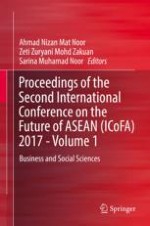2019 | OriginalPaper | Buchkapitel
Factors Influencing Waqf Participation Among Muslims: The Moderating Role of Attitude
verfasst von : Hasyeilla Abd Mutalib, Sarina Muhamad Noor, Noraini Nasirun, Rabitah Harun, Wan Mohd Yaseer Mohd Abdoh
Erschienen in: Proceedings of the Second International Conference on the Future of ASEAN (ICoFA) 2017 - Volume 1
Verlag: Springer Singapore
Aktivieren Sie unsere intelligente Suche, um passende Fachinhalte oder Patente zu finden.
Wählen Sie Textabschnitte aus um mit Künstlicher Intelligenz passenden Patente zu finden. powered by
Markieren Sie Textabschnitte, um KI-gestützt weitere passende Inhalte zu finden. powered by
